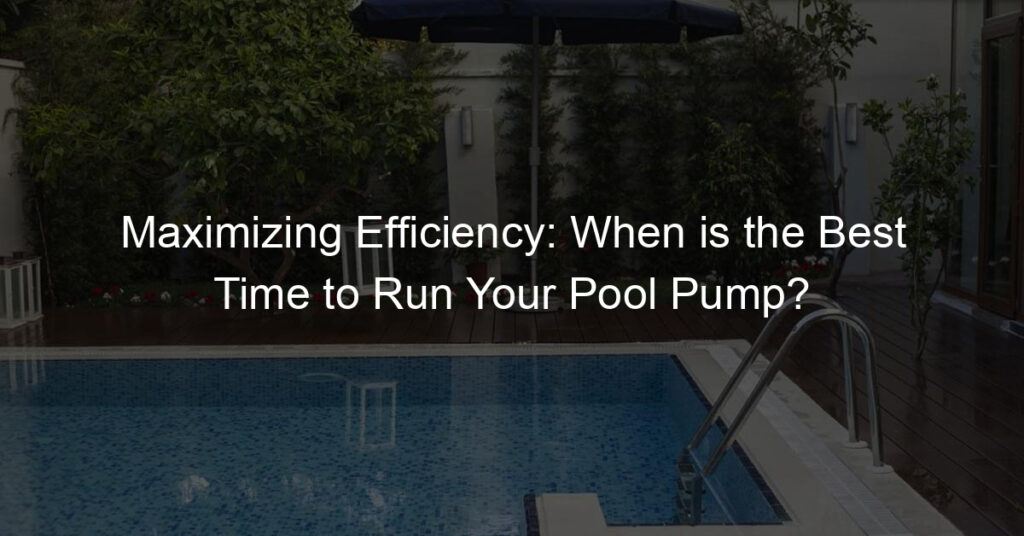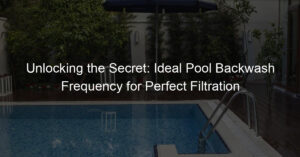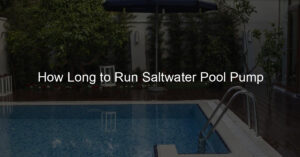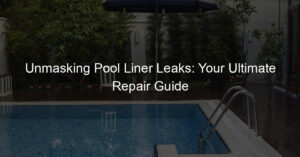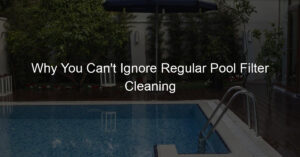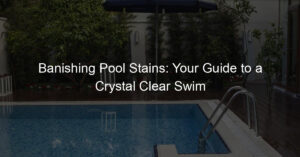Introduction to Pool Pump Operation
Operating a pool pump might seem complicated at first, but once you understand the basics, it becomes a straightforward task. This section will introduce you to the fundamentals of pool pump operation and the importance of using it efficiently.
- Understanding the basics of pool pump operation
A pool pump is the heart of your swimming pool. It circulates water through the pool’s filter, keeping it clean and safe for swimming. The pump pulls water from the pool, pushes it through the filter, and then returns it to the pool. This cycle is essential to maintain a healthy and enjoyable swimming environment.
There are three main types of pool pumps: single-speed, dual-speed, and variable-speed. Single-speed pumps run at one constant speed, while dual-speed pumps have a high and low setting. Variable-speed pumps can be adjusted to any speed, providing the most flexibility and energy efficiency.
- Importance of efficient pool pump usage
Using your pool pump efficiently is crucial for several reasons. Firstly, an efficient pump uses less energy, which can significantly reduce your electricity bill. According to the U.S. Department of Energy, an energy-efficient pool pump can save up to 75% on energy costs compared to a standard pump.
Secondly, efficient pool pump usage contributes to a cleaner and healthier pool. It ensures that the water is adequately circulated and filtered, removing debris and preventing the growth of algae and bacteria. This results in clearer water and less need for chemical treatments.
Lastly, efficient pool pump usage extends the lifespan of the pump and other pool equipment. It reduces wear and tear, saving you money on repairs and replacements in the long run.
In conclusion, understanding how your pool pump operates and using it efficiently is key to maintaining a clean, safe, and cost-effective swimming pool.
Best Time for Running Pool Pump
Understanding the best time to run your pool pump can significantly improve your pool’s cleanliness and efficiency. Let’s delve into the factors that influence the optimal pool pump time and look at a case study comparing different pool pump schedules.
- Factors influencing the optimal pool pump time
- Pool size: Larger pools require longer pump times to circulate and filter all the water.
- Pool usage: If your pool is used frequently, you may need to run the pump more often to keep the water clean.
- Weather conditions: In hot weather, algae grow faster, requiring more frequent pumping. In contrast, cooler weather may allow for less frequent pump operation.
- Energy costs: Running your pool pump during off-peak hours can help reduce energy costs.
- Case study: Comparing different pool pump schedules
Several factors can impact the best time to run your pool pump. These include:
To illustrate the importance of choosing the right pool pump schedule, let’s consider a case study comparing two different schedules.
| Schedule | Pool Size | Pool Usage | Weather Conditions | Energy Costs |
|---|---|---|---|---|
| Schedule 1 (8 hours/day) | Large | High | Hot | High |
| Schedule 2 (4 hours/day) | Small | Low | Cool | Low |
In Schedule 1, the pool pump runs for 8 hours each day. This schedule is suitable for a large pool that is frequently used in hot weather conditions. However, it comes with high energy costs.
In contrast, Schedule 2 involves running the pump for 4 hours each day. This schedule is ideal for a small pool with low usage in cool weather conditions. It also results in lower energy costs.
As this case study shows, the best pool pump schedule depends on various factors, including pool size, usage, weather conditions, and energy costs. By considering these factors, you can choose the most efficient and cost-effective schedule for your pool.
Maximizing Pool Pump Efficiency
Efficiency is a key factor when it comes to pool pump operation. By maximizing your pool pump’s efficiency, you can save on energy costs and prolong the lifespan of your pump. Here are some practical tips to help you achieve this.
Pool Pump Energy Saving Tips
There are several ways to make your pool pump more energy-efficient. Here are two important tips to consider:
- Tip 1: Adjusting the Pool Pump Running Hours
- Tip 2: Regular Maintenance for Pool Pump Efficiency
One of the simplest ways to save energy is by adjusting the running hours of your pool pump. It’s a common misconception that pool pumps need to run 24/7. In reality, reducing the running hours to match the needs of your pool can lead to significant energy savings. For instance, running your pump during off-peak hours when electricity rates are lower can reduce energy costs. Also, consider the size, usage, and cleanliness of your pool when setting the running hours.
Regular maintenance is crucial for maintaining pool pump efficiency. This includes cleaning the pump basket and filter regularly to prevent blockages, which can cause the pump to work harder and consume more energy. Additionally, checking the pump for leaks and repairing them promptly can also improve efficiency. Remember, a well-maintained pool pump not only uses less energy but also lasts longer.
By implementing these tips, you can significantly improve the efficiency of your pool pump, leading to energy savings and a longer pump lifespan. Remember, an efficient pool pump is a cost-effective pool pump.
Swimming Pool Pump Timing
Understanding the timing of your pool pump is crucial to its efficiency. Let’s delve into how timing impacts your pool pump’s performance and identify the best times to run your pool pump.
- Understanding the Impact of Timing on Pool Pump Efficiency
- Key Takeaway: Best Times for Running Your Pool Pump
The timing of your pool pump can significantly affect its efficiency. Running your pool pump continuously throughout the day may seem like a good idea to keep your pool clean. However, this can lead to unnecessary energy consumption and increased wear and tear on your pump.
On the other hand, running your pool pump for a few hours during off-peak times can save energy and prolong the life of your pump. Off-peak times refer to periods when demand for electricity is low, typically during the night or early morning. Running your pump during these times can also help avoid peak time energy surcharges.
Remember, the goal is to circulate the pool’s water at least once a day. This is known as the turnover rate. For most residential pools, this can be achieved in about 8 to 12 hours of pump operation.
So, when is the best time to run your pool pump? The answer largely depends on your specific circumstances, including your local utility rates and the size of your pool. However, a general rule of thumb is to run your pool pump during off-peak hours to maximize energy efficiency.
For example, you might run your pump from early morning to mid-afternoon, then turn it off during the late afternoon and evening when electricity demand and rates are typically higher. Alternatively, you could run your pump overnight when electricity demand is generally lower.
Remember, the key to efficient pool pump operation is not just about the length of time the pump runs, but also the timing of when it runs. By understanding and optimizing your pool pump timing, you can enjoy a clean, well-maintained pool while saving on energy costs.
Pool Maintenance Tips
Proper pool maintenance is essential for the longevity and efficiency of your pool pump. In this section, we will discuss the importance of regular cleaning and inspection.
Regular Cleaning and Inspection
Regular cleaning and inspection of your pool and its pump can significantly improve its efficiency and lifespan. Let’s delve into the details.
- How regular cleaning affects pool pump efficiency
- Inspection checklist for optimal pool pump operation
Regular cleaning of your pool and its pump is not just about keeping the water sparkling and inviting. It has a direct impact on the efficiency of your pool pump. When the pool is clean, the pump doesn’t have to work as hard to filter out debris and contaminants. This reduces the strain on the pump, helping it run more efficiently and last longer. For instance, a clean pool can improve pump efficiency by up to 25%!
Regular inspection of your pool pump is just as important as cleaning. Here’s a simple checklist to ensure optimal operation:
| Checklist Item | Description |
|---|---|
| Check for leaks | Look for signs of water leakage around the pump. Leaks can cause the pump to work harder, reducing its efficiency. |
| Inspect the pump basket | Ensure the pump basket is not clogged with debris. A clogged basket can hinder water flow, making the pump work harder. |
| Check the pump motor | Listen for unusual noises from the pump motor. Unusual noises could indicate a problem that needs immediate attention. |
| Inspect the pool filter | Ensure the pool filter is clean and functioning properly. A dirty filter can reduce the efficiency of the pump. |
Regular cleaning and inspection can go a long way in maintaining the efficiency of your pool pump. Remember, a well-maintained pool pump not only operates more efficiently but also lasts longer, saving you money in the long run.
Seasonal Pool Pump Maintenance
Just like other appliances in your home, your pool pump also requires seasonal maintenance. This not only ensures its longevity but also its efficiency. Let’s delve into how you can prepare your pool pump for different seasons and understand the impact of seasonal changes on pool pump efficiency.
- Preparing your pool pump for different seasons
- Spring: After a long winter, it’s time to get your pool ready for use. Clean the pool and the pump thoroughly. Check the pump for any damage that might have occurred during winter.
- Summer: This is when your pool pump will be working the hardest. Ensure it is running smoothly and clean it regularly to prevent any blockages.
- Autumn: Falling leaves can cause blockages. Regularly clean your pool and the pump to prevent this.
- Winter: If you live in a region with harsh winters, consider winterizing your pool pump to protect it from the cold.
- Case study: Seasonal changes in pool pump efficiency
Each season brings its own set of challenges for your pool pump. Here’s how you can prepare your pool pump for each season:
Let’s consider a case study to understand how seasonal changes can affect pool pump efficiency. A study was conducted on a pool pump in a region with all four seasons. The pump was observed for a year, and its efficiency was measured each season.
| Season | Efficiency |
|---|---|
| Spring | High |
| Summer | Medium |
| Autumn | Medium |
| Winter | Low |
The study found that the pump’s efficiency was highest in spring, when the pump was freshly cleaned and prepared for the pool season. It was medium in summer and autumn, due to increased usage in summer and falling leaves in autumn. In winter, the efficiency was lowest, due to the cold weather and less usage.
This case study highlights the importance of seasonal pool pump maintenance. By preparing your pool pump for each season, you can ensure its efficient operation and prolong its lifespan.
Conclusion: Achieving Efficient Pool Pump Usage
As we wrap up our discussion on pool pump operation, it’s important to remember that achieving efficiency is not a one-time task. It requires consistent effort and adherence to best practices. Let’s take a moment to recap what we’ve learned and share some final thoughts on maximizing pool pump efficiency.
- Recap of best practices for pool pump operation
Proper pool pump operation is key to maintaining a clean and healthy pool. Here are the best practices we’ve discussed:
- Run your pool pump during off-peak hours to save on energy costs.
- Ensure regular maintenance of your pool pump to prevent breakdowns and extend its lifespan.
- Use a pool cover when the pool is not in use to reduce the load on the pump.
- Consider investing in an energy-efficient pool pump to save on electricity costs in the long run.
- Final thoughts on maximizing pool pump efficiency
Maximizing pool pump efficiency is not just about saving money, it’s also about doing our part for the environment. By using our pool pumps more efficiently, we can reduce our carbon footprint and contribute to a more sustainable future.
Remember, every little bit helps. Even small changes in how we operate our pool pumps can lead to significant savings over time. So, let’s put what we’ve learned into practice and strive for efficient pool pump usage.
As the saying goes, “The journey of a thousand miles begins with a single step.” Let that step be towards efficient pool pump usage. Here’s to a cleaner pool and a greener planet!

